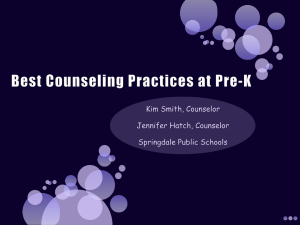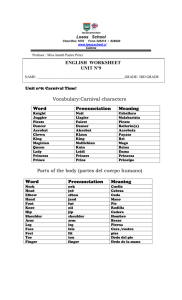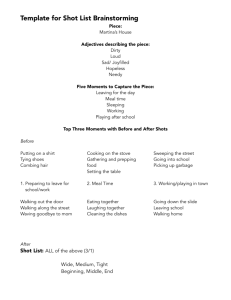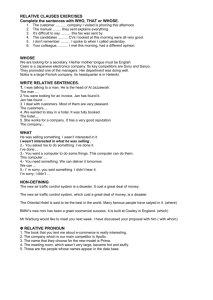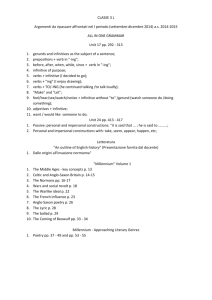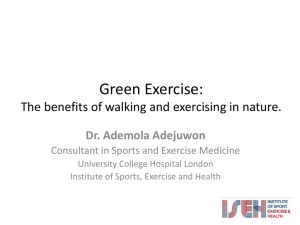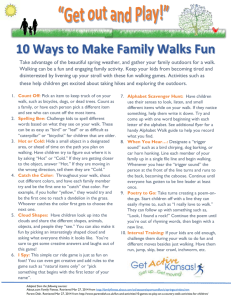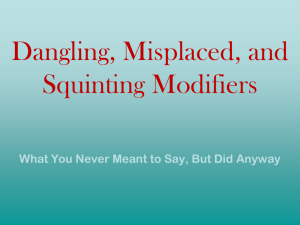PAST SIMPLE
advertisement
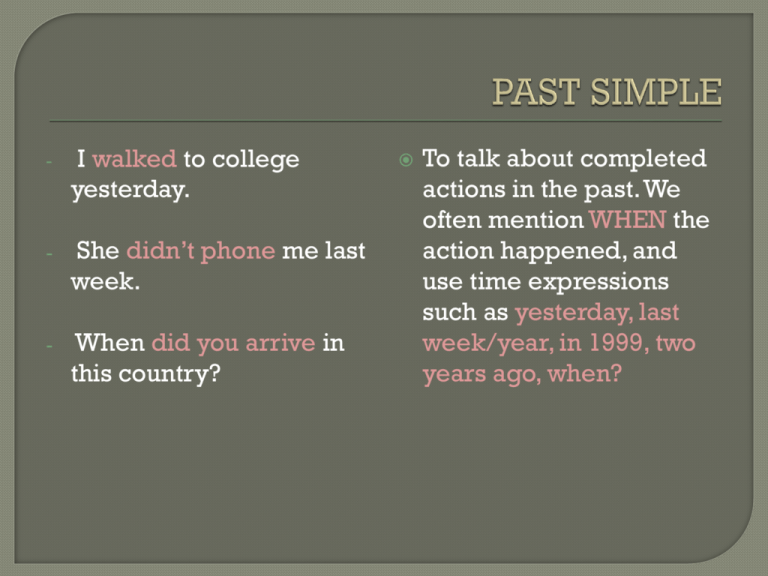
- I walked to college yesterday. - She didn’t phone me last week. - When did you arrive in this country? To talk about completed actions in the past. We often mention WHEN the action happened, and use time expressions such as yesterday, last week/year, in 1999, two years ago, when? POSITIVE I/you/he/she/it/we/they finished went NEGATIVE (did not/didn’t + verb) I/you/he/she/it/we/they did not/didn’t finish did not/didn’t go QUESTIONS (did + subject + verb) Did I/you/he/she/it/we/they finish Did I/you/he/she/it/we/they go 1. 2. 3. 4. 5. 6. 7. 8. 9. 10. 11. It was warm, so I ___ (take) off my coat. The film wasn’t very good. I ___ (enjoy) it very much. I knew Sarah was very busy, so I ___ (disturb) her. I was very tired, so I ___ (leave) the party early. The bed was very uncomfortable. I ___ (sleep) very well. The window was open and a bird ___ (fly) into the room. The hotel wasn’t very expensive. It ___ (cost) very much. I was in a hurry, so I ___ (have) time to phone you. It was hard carrying the bags. They ___ (be) heavy. What ___ (you/do) at the weekend? Where ___ (you/go) last night? -It wasn’t raining at the time. -What were you doing at 6 o’clock yesterday? -for - I was walking down the street when I met an old friend. - - While - I was cleaning the floors, the children were washing the windows. actions and situations that were in progress at a particular time in the past to describe something in progress when the second action happened for two actions that were both in progress at the same time POSITIVE (was/were + -ing) I/he/she/it was walking you/we/they were walking NEGATIVE (was not/wasn’t/were not/weren’t + -ing) I/he/she/it was not/wasn’t walking you/we/they were not/weren’t walking QUESTIONS (was/were … + -ing?) Was I/he/she/it walking Were you/we/they walking 1. 2. 3. 4. 5. 6. 7. 8. 9. Jenny ___ (wait) for me when I ___ (arrive). What ___ (you/do) at this time yesterday? ___ (you/go) out last night? How fast ___ (you/drive) when the accident ___ (happen)? Sam ___ (take) a photograph of me while I ___ (not/look). We were in a very difficult position. We ___ (not/know) what to do. I ___ (walk) along the street when suddenly I ___ (hear) footsteps behind me. Somebody ___ (follow) me. I was so scared and I ___ (start) to run. When I was young, I ___ (want) to be a pilot. Last night I ___ (drop) a plate when I ___ (do) the washing up. Fortunately it ___ (not/break). I used to play tennis a lot, but I don’t play very often now. This building is now a furniture shop. It used to be a cinema. PAST HABIT = it happened regularly in the past, but no longer happens PAST STATE = things that were true, but are not true any more positive he used to play used to + infinitive negative he didn’t use to play didn’t + use to + infinitive question Did he use to play…? did + S + use to + infinitive 1. 2. 3. 4. 5. 6. 7. 8. Diane doesn’t travel much now. She _____ a lot, but she prefers to stay at home these days. Liz _____ a motorbike, but last year she sold it and bought a car. We came to live in London a few years ago. We _____ in Leads. I rarely eat ice-cream now, but I _____ it when I was a child. Jim _____ my best friend, but we aren’t good friends any longer. It only takes me about 40 minutes to get to work now that the new road is open. It _____ me more than an hour. There _____ a hotel near the airport, but it closed a long time ago When you lived in New York, _____ to the theatre very often?
